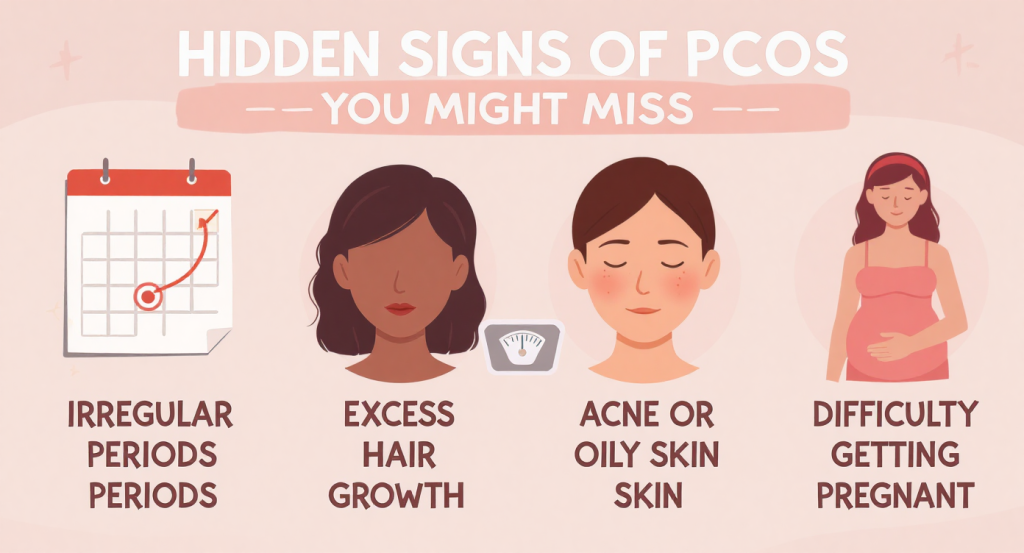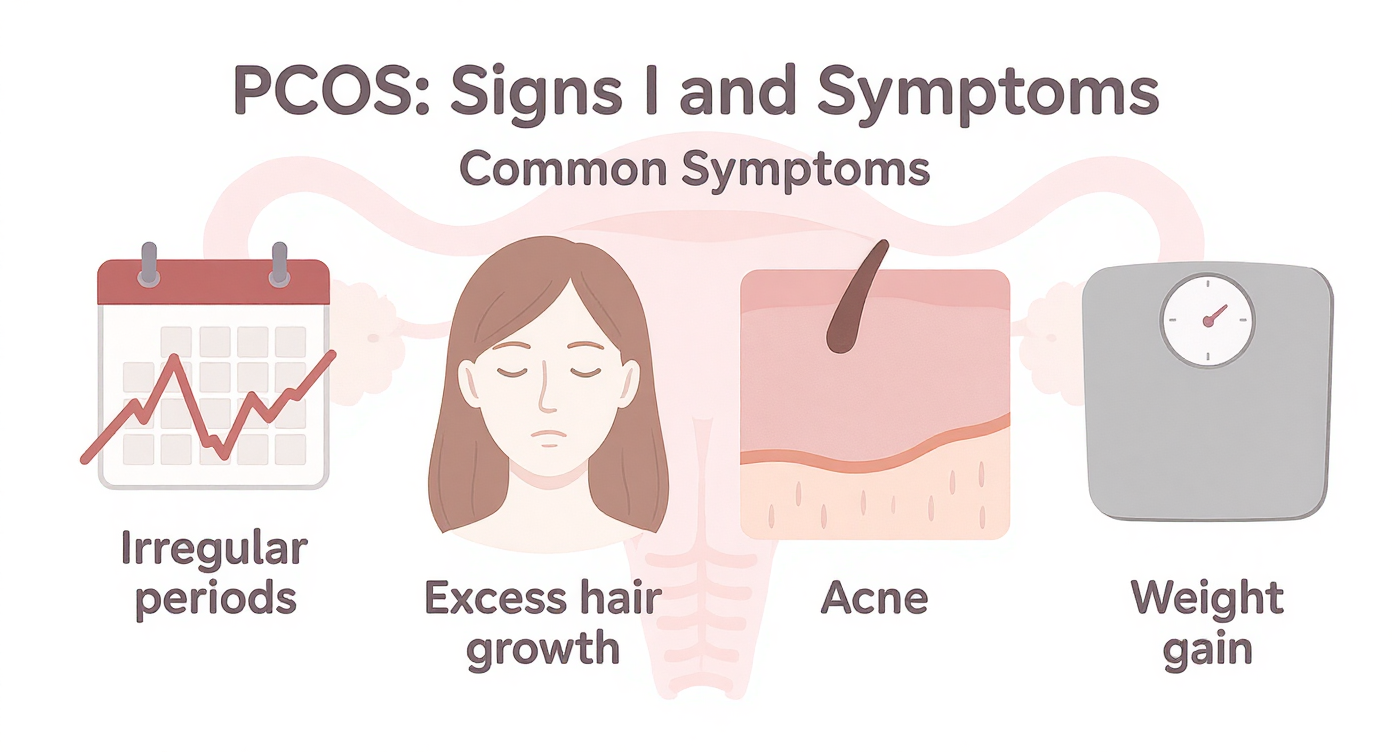Polycystic Ovary Syndrome (PCOS) is one of the most common hormonal disorders affecting women of reproductive age. Yet, despite how widespread it is, it remains underdiagnosed, misunderstood, and often brushed off as “just irregular periods.” But PCOS is far more than that—it’s a complex condition with a wide range of symptoms, some subtle and some hard to ignore.
If you’ve ever asked yourself:
- What are the symptoms of PCOS?
- What are the signs of PCOS in females?
- What are the first signs of PCOS?
You’re not alone.
In this guide, we’ll break down the signs and symptoms of PCOS, how it affects the body and mind, and what kind of pain and complications it can bring. Whether seeking clarity for yourself or someone you care about, this post is your comprehensive starting point.
What Is PCOS? A Quick Overview
Polycystic Ovary Syndrome is a hormonal imbalance that affects how the ovaries work. The name comes from the small, fluid-filled sacs or cysts that often appear on the ovaries in women with the condition. But not all women with PCOS have cysts, and not all ovarian cysts mean you have PCOS.
The root problem in PCOS lies in hormone disruption, particularly an excess of androgens (male hormones), insulin resistance, and irregularities in ovulation.
What Are the First Signs of PCOS?
For many women, the early signs of PCOS appear during their teenage years, though the condition may not be diagnosed until much later. The first symptoms of PCOS often include:
- Irregular periods: Skipping periods or having fewer than nine menstrual cycles a year.
- Excess hair growth: Particularly on the face, chest, or back (a condition known as hirsutism).
- Severe acne: Especially on the jawline, chin, or cheeks, often resistant to typical acne treatments.
- Weight gain or difficulty losing weight: Often centered around the abdomen.
- Oily skin and dandruff: Due to increased androgen levels.
These early PCOS signs may seem like typical adolescent changes, which is why they’re often overlooked
Signs and Symptoms of PCOS in Females
The symptoms of PCOS in females vary from person to person, but they tend to affect the entire body, from your reproductive system to your metabolism and even your mental health. Here’s a breakdown of the most common PCOS symptoms:
1. Irregular or Absent Periods
This is one of the hallmark signs. Many women with PCOS ovulate irregularly or not at all, leading to missed or irregular periods. Some may go months without menstruation, while others have cycles that are unusually long or heavy.
2. Infertility
Because ovulation is often disrupted, PCOS is one of the leading causes of female infertility. Women may struggle to conceive naturally without assistance or ovulation-inducing medications.
3. Excess Hair Growth (Hirsutism)
Up to 70% of women with PCOS experience excess hair growth in areas like the upper lip, chin, chest, abdomen, or back, due to higher levels of androgens.
4. Acne and Oily Skin
Persistent acne that resists standard treatments is another key symptom. The skin may also become noticeably oily, particularly around the T-zone.
5. Scalp Hair Thinning
While excess hair grows in unwanted places, women with PCOS often experience thinning scalp hair—similar to male-pattern baldness.
6. Weight Gain or Trouble Losing Weight
Even with a regular diet and exercise, many women with PCOS find it hard to lose weight. Most of the excess fat tends to accumulate around the abdomen, a pattern associated with higher insulin resistance.
7. Dark Patches of Skin (Acanthosis Nigricans)
These are often seen in body folds like the neck, underarms, or groin and indicate insulin resistance.
8. Fatigue and Low Energy
Many women with PCOS report chronic fatigue, feeling tired even after a full night’s sleep. Hormonal imbalances and blood sugar fluctuations may contribute to this.
9. Mood Swings, Anxiety, and Depression
PCOS doesn’t just affect the body—it impacts mental health too. The constant battle with physical symptoms, fertility issues, and body image can contribute to feelings of anxiety and depression.
PCOS Symptoms Pain: What Does It Feel Like?
While PCOS isn’t typically associated with sharp, constant pelvic pain, many women experience a form of PCOS pain that comes and goes. Here are the most common types of discomfort:
- Pelvic pain or heaviness, especially during menstruation or ovulation.
- Ovarian discomfort from enlarged ovaries or cysts.
- Headaches are caused by hormone fluctuations.
- Pain during intercourse, especially if the ovaries are enlarged.
- Abdominal bloating or tenderness.
Pain isn’t the most obvious PCOS symptom, but for some women, it’s part of their daily life.
Hidden Signs of PCOS You Might Miss

Not all signs of PCOS are physical. Many women silently suffer from symptoms they don’t immediately connect to the condition:
- Sugar cravings and frequent hunger: Related to insulin resistance.
- Sleep apnea: More common in overweight women with PCOS.
- Brain fog: Difficulty concentrating or remembering things.
- Low libido: A result of hormonal imbalance or body image struggles.
Because these symptoms don’t seem gynecological in nature, they often go undiscussed with healthcare providers.
How PCOS Affects Long-Term Health
PCOS isn’t just a reproductive disorder—it’s a metabolic and endocrine condition with long-term health risks. If left unmanaged, it can increase the chances of:
- Type 2 diabetes
- High blood pressure
- High cholesterol
- Endometrial cancer
- Heart disease
- Gestational diabetes during pregnancy
That’s why early diagnosis and lifestyle management are so crucial.
When to See a Doctor
Because PCOS symptoms can be subtle or overlap with other conditions, many women delay seeking help. However, early detection can prevent long-term complications such as infertility, diabetes, and heart disease. You should consult a healthcare provider if you notice any of the following signs or symptoms:
- Irregular periods or none at all
- Unexplained weight gain
- Increased facial/body hair
- Difficulty getting pregnant
- Persistent acne or thinning scalp hair
PCOS is typically diagnosed through a combination of:
- Medical history
- Physical exam
- Blood tests (to check hormone levels)
- Pelvic ultrasound (to check for ovarian cysts)
Can PCOS Symptoms Be Treated?
There is no permanent cure for PCOS, but the good news is that its symptoms can be effectively managed. The right combination of lifestyle changes, medications, and medical supervision can help regulate your cycle, reduce discomfort, and protect long-term health. Management is not one-size-fits-all—treatment depends on your symptoms, goals (like fertility), and underlying health conditions.
Here are the most common and proven PCOS treatment options:
Lifestyle Changes
- A low-glycemic diet and regular exercise can reduce insulin resistance.
- Weight loss (even 5-10% of body weight) can restore regular periods and improve fertility.
Medications
- Birth control pills to regulate periods and reduce androgens.
- Metformin to improve insulin sensitivity.
- Clomiphene or Letrozole for fertility treatment.
- Spironolactone to reduce unwanted hair and acne.
Holistic Approaches
Some women manage symptoms with herbal remedies, supplements (like inositol), acupuncture, and stress-reducing practices such as yoga and meditation. Always consult your doctor before starting alternative treatments.
Living With PCOS: You’re Not Alone
PCOS affects millions of women worldwide, and no two experiences are alike. Some women have every symptom. Others might only struggle with irregular periods or acne. What matters is listening to your body, tracking your symptoms, and seeking support.
Support groups, both in person and online, can offer emotional comfort and helpful insights. The journey with PCOS can be frustrating, but it can also be empowering, with the right tools, care, and mindset.
Final Thoughts
Understanding the signs and symptoms of PCOS in females is the first step to reclaiming control over your health. Whether you’re experiencing the early warning signs, managing long-term effects, or simply trying to make sense of unexplained weight gain, acne, or irregular cycles, know that PCOS is treatable, and you are not alone.
From pain to emotional toll, PCOS is a full-body condition that deserves more awareness and compassion. The more we talk about it, the more we can reduce shame, increase early diagnosis, and help women find the answers they’ve been searching for.
